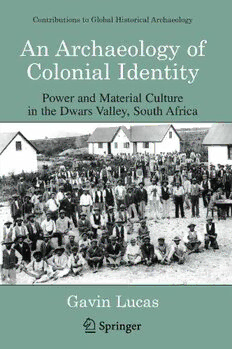
An Archaeology of Colonial Identity: Power and Material Culture in the Dwars Valley, South Africa PDF
230 Pages·2006·12.649 MB·English
Most books are stored in the elastic cloud where traffic is expensive. For this reason, we have a limit on daily download.
Preview An Archaeology of Colonial Identity: Power and Material Culture in the Dwars Valley, South Africa
Description:
This book examines how colonial identities were constructed in the Cape Colony of South Africa since its establishment in the 17th century up to the 20th century. It is an explicitly archaeological approach but which also draws more widely on documentary material to examine how different people in the colony – from settler to slave – constructed identities through material culture. The book explores three key groups: The Dutch East India Company, the free settlers and the slaves, through a number of archaeological sites and contexts. With the archaeological evidence, the book examines how these different groups were enmeshed within racial, sexual, and class ideologies in the broader context of capitalism and colonialism, and draws extensively on current social theory, in particular post-colonialism, feminism and Marxism. This book is aimed primarily at archaeologists, but will also attract historians and those interested in cultural theory and material culture studies. Specifically, historical archaeologists and students of historical archaeology will be the primary readership and buyers.
See more
The list of books you might like
Most books are stored in the elastic cloud where traffic is expensive. For this reason, we have a limit on daily download.
